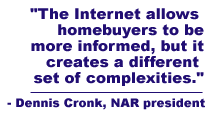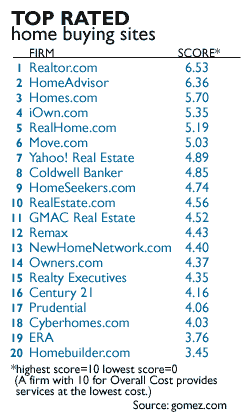|
Real estate red flags
|
 |
July 12, 2000: 10:42 a.m. ET
Shopping for homes online can be hazardous if you aren't careful
By Staff Writer Shelly K. Schwartz
|
NEW YORK (CNNfn) - Crime rates. School test scores. The price your neighbor paid for the four-bedroom Colonial next door.
It's all available in cyberspace. And the best part is, it's free.
Would-be homeowners once relied exclusively upon professional agents to do their legwork for them. But today, armed with the Internet, Web-savvy consumers are learning to do for themselves -- shopping for the latest property listings, putting their own homes on the market and locking in mortgages with little or no assistance.
Advocates of do-it-yourself real estate say such technology puts the buyer back in the driver's seat, giving them the tools they need to save valuable time and money.
But there are those, too, who say buying and selling property remains a complex transaction -- not to mention the most costly investments most of us will ever make. The growing trend toward online independence, they warn -- the same one that took  hold in the stock market arena and left novice day-traders badly burned -- could cost you dearly. hold in the stock market arena and left novice day-traders badly burned -- could cost you dearly.
"When shopping online, you could end up with the wrong mover, the wrong insurance, the wrong Realtor and the wrong mortgage," said Richard Roll, president of the American Homeowners Association. "It happens all the time. Basically, you could end up being disappointed in the result of your choice, or lack of choice [on the Web] as the case may be."
Roll, who also serves as Chief Executive of realhome.com, a consumer Web site offering tips on everything from first-time home buying to mortgage refinancing, said cybersurfers should view with skepticism any Web site they use for decision-making.
"A lot of sites are supported by advertising and are beholden to their sponsors and there's not really a clear differentiation in some cases between so-called editorial or news content and their ads," he said. "If you go to a site that looks great but they have exclusive sponsorships with a moving company or insurance provider, for example, you may not be getting objective decision-making support. As a consumer, you don't need to fall victim to that. You just need to be aware of it."
The Internet revolution
Although still in its infancy, the Internet already has left a profound footprint on the real estate industry. Its popularity and efficiency are impossible to ignore.
The National Association of Realtors (NAR) reports that close to 40 percent of homebuyers today use the Net in some way, shape, or form during the home-buying process.
At the same time, other data reveal those who use the Web to hunt for homes visit just six or seven homes before making a buy, having narrowed down their search online. Their counterparts, who rely solely upon the assistance of an agent, waste far more time touring homes -- visiting an average of 15-to-25 properties -- before sitting down at the closing table.

Such statistics beg the question: Is the role of the real estate agent obsolete?
NAR President Dennis Cronk, a long-time real estate professional, says no.
"The Internet allows homebuyers to be more informed, but it creates a different set of complexities," he said. "When you go to the Internet, you get more information than you need to accomplish what you want and sometimes it's just more confusing than helpful. It really stresses the need for a professional to provide that help and interpret all that information."
That includes financing options.
In the low-interest rate environment homeowners enjoyed in the 1990s, deciding which loan product to choose was a no-brainer. Most borrowers took a 30-year fixed rate mortgage and locked it in while they had the chance.
 Today, however, with Federal Reserve Chairman Alan Greenspan on a quest to cool the go-go economy with a steady stream of rate hikes, that decision has become cloudy. Add to that the growing diversity of loan products and Cronk said you've got a recipe for mass confusion. Today, however, with Federal Reserve Chairman Alan Greenspan on a quest to cool the go-go economy with a steady stream of rate hikes, that decision has become cloudy. Add to that the growing diversity of loan products and Cronk said you've got a recipe for mass confusion.
"Financing is much more complex today than it was before," he said. "There are literally hundreds of different financing tools, such as Adjustable Rate Mortgages (ARMs) tied to Treasury bills and balloon mortgages. Depending on the needs of the buyer it's the agent who is going to have to help them match up the tool that best meets their objective. When rates go up, the agents have to be more creative."
Just 10 years ago, Cronk said 80 percent of his business stemmed from matching buyers with sellers and 20 percent of it was taking clients to the closing table. Today, he said, that percentage has reversed.
Of course, professional advice doesn't come cheap. Sellers typically pay agents who sell their home a total commission of roughly 6 percent on the sale price. That's $12,000 on a $200,000 home. But the advantage of using an agent is greater market exposure, screening for serious buyers and a faster transaction.
And selling your home alone, while certainly cost-effective, does indeed come with its own set of headaches. Among them, pre-qualifying potential buyers, complex state disclosure laws and the tendency for many consumers to overprice their home, which can leave a property to languish on the market for months.
Potential pitfalls
When using the Web to hunt for homes, experts say the best defense is a good offense.
"Consumers can get themselves into trouble," said N'ann Harp, president of Smart Consumer Services in Crystal City, Va. "They need to be warned against being credulous -- or naïve -- about what they see on Web sites. There is no limitation, protections or auto-confirmation of the validity or fallacy of what a commercial vendor can say on a Web site. It's a total free-for-all."
Roll, of the AHA, notes you should always verify any financial advice and home buying tips you read on the Web and in no case should you accept as fact the content of a single source.
Also, stay away from sites that encourage you to go with one particular insurer, builder, or supplier. Chances are good that Web site profits from the business they send there, and the advice isn't based on what's best for you.
"You could end up with a broker who doesn't have your best interest at heart or who misrepresented themselves," Roll said. "Their site may seem warm and fuzzy but they may be representing the seller and feeding you selective information."
Other good advice is to stick with unbiased government and non-profit sources -- at least for the basics on financial advice. The Housing and Urban Development Department offers a complete online consumer's guide for prospective homebuyers and renters that should answer most of your questions.
The General Services Administration also offers numerous guides -- which are either free or in the $1-to-$2 range -- for homebuyers with questions on buying and selling a home, on settlement and financing options and refinancing.
(Click here for an easy tool that tells you how much home you can afford.)
Top picks
Robert Shenk, executive director of America Online's financial services division, agrees consumers should use discretion when surfing the Web. AOL (AOL: Research, Estimates) has agreed to merge with Time Warner (TWX: Research, Estimates), the parent company of CNNfn.
"You should always make sure you're using a reputable Web site that is updated regularly," he said. "Many times Web sites will show homes listed for sale when they've already been sold."
To help give shoppers an edge, Gomez.com, an e-commerce rating firm, recently ferreted out some of the best online home buying sites on the Web based on, among other things, the number of property listings they provide and the tools they offer to search for homes based on price, number of bedrooms, and locale.
Realtor.com took top honors for the second year in a row. The Web site, which is the official Internet site of the National Association of Realtors,  has the Net's largest database of for-sale listings, receiving data feeds from 730 Multiple Listing Services nationwide. That represents 90 percent of all the properties available via MLS, according to Gomez. has the Net's largest database of for-sale listings, receiving data feeds from 730 Multiple Listing Services nationwide. That represents 90 percent of all the properties available via MLS, according to Gomez.
It does not, however, include For Sale By Owner (FSBO) listings since it's a product of NAR, which is looking to maintain business for its Realtor members.
As for mortgage sites, Gomez gave Mortgagebot.com its highest rating, based on its strong customer service policy and a wide variety of loan products, including Adjustable Rate Mortgages (ARMs), financing for second homes, investment properties and two-to-four unit properties throughout the U.S. E-Loan and LoansDirect claimed the second and third slots respectively.
Be cautious but don't be afraid
In short, Roll said consumers should stick to using the Internet for what it was intended -- a great research tool. Exercise the same buyer-beware cautions that drive your decision-making at the shopping mall and you'll be fine.
"The Internet has given us the freedom to get information that's not totally controlled by any one gatekeeper so you can really do comparative research and get the best decision support out there," he said. "On the other hand, I think there is a danger of falling into the illusion that any one particular site should be your sole solution to all of your needs. You should look at sites from the perspective of whether or not they are unbiased and giving you all the perspectives on a given subject in an objective fashion." 
|
|
|
|
|
 |

|

